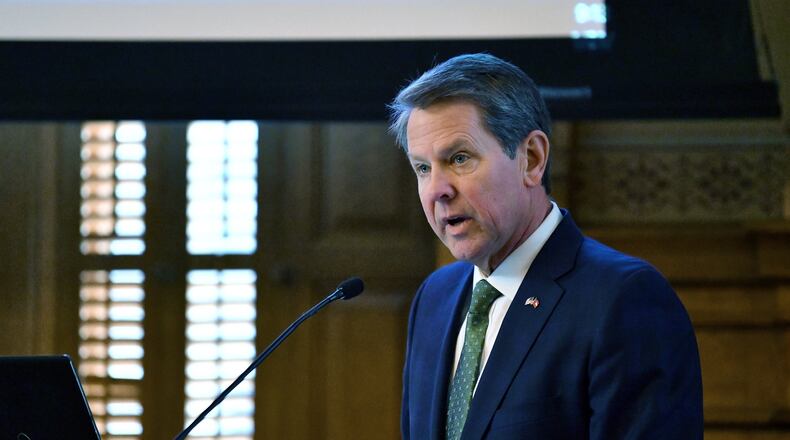State, university and k-12 school employees should see a bump in their paychecks next month after Gov. Brian Kemp on Wednesday signed a $30.2 billion midyear budget that includes raises and bonuses for workers and a $1 billion tax refund for Georgians.
The $30.2 billion midyear spending plan, which adds $3 billion in expenditures from the original budget, runs through June 30. The General Assembly approved the election-year spending plan last week.
Much of the midyear budget follows the proposals Kemp made in January.
“This budget funds our priorities and sets our state on a clear path to a continued strong recovery in coming months as we fully turn the page on the (COVID-19) pandemic,” Kemp said before signing the budget.
The budget includes $1.6 billion for state income tax refunds that Kemp proposed earlier this year after the government ran a surplus in fiscal 2021. A state fiscal note last week suggested the refund program, which would give single tax filers a $250 refund and joint filers $500, would actually cost closer to $1.1 billion.
The Senate gave final approval Wednesday to House Bill 1302, which would allow single Georgians to receive a $250 refund when they file their taxes, joint filers $500. The refunds would go to those who filed returns for both the tax years 2020 and 2021, and the money would be available in six to eight weeks.
Kemp — who faces both Republican and Democratic challengers for reelection this year — was able to request big increases in spending for salaries, education and health care because tax collections are running 16% ahead of last year for the first eight months of fiscal 2022.
Typically, the midyear budget is used to fund growth in school enrollment and increased costs for Medicaid, the state-federal health care program for the poor, disabled and nursing care.
But after ending fiscal 2021 with a $3.7 billion surplus — in part because of massive federal COVID-19 relief funding — and now eight months of continuing revenue growth, the state has plenty of money to spend.
“This a good budget, one that invests strategically in priorities for a growing, thriving state while returning more than $1 billion to Georgia taxpayers,” House Speaker David Ralston, R-Blue Ridge, said at a budget-signing ceremony at the Capitol.
The midyear plan includes more than $500 million to give about 100,000 state and University System of Georgia employees a $5,000 raise. State officials hope raises will help stem the high turnover rate among state workers, many of whom have seen little or no salary boost in recent years.
The measure makes the raise $7,000 for officers who work in Department of Corrections and Department of Juvenile Justice facilities, which have seen high turnover rates for years. Some agencies have annual turnover rates over 25%, in part because of low pay. In the state Juvenile Justice Department, it’s closer to 90%.
Full-time and part-time k-12 employees — such as teachers and staff — will receive a $2,000 bonus. Teachers will get a $2,000 raise in fiscal 2023, allowing Kemp to meet his 2018 campaign promise of giving them a $5,000 increase over the course of his first term.
The spending plan includes about $390 million to restore spending cuts to k-12 schools that lawmakers approved in 2020, when reductions were made in anticipation that the COVID-19 pandemic would bring a severe recession. Other agencies also will see the money cut during the 2020 session restored to their budgets.
The midyear plan includes big increases for Medicaid, the health care program for the poor and disabled and nursing homes, which were hit hard by the pandemic, as well as for law enforcement.
The budget has $432 million to get a start on a plan to buy a private prison and build a new one. The idea is the new bed space would replace more run-down and dangerous facilities.
The midyear spending plan includes $112.6 million to buy and develop the land for Rivian’s new electric-vehicle manufacturing plant east of Atlanta.
Lt. Gov. Geoff Duncan, who also attended the budget-signing ceremony, said: “It’s easy to tell the priorities of a legislature and governor by how they budget, and certainly this amended budget is no exception. These investments are only possible because of strong conservative leadership.”
.
About the Author
Keep Reading
The Latest
Featured




